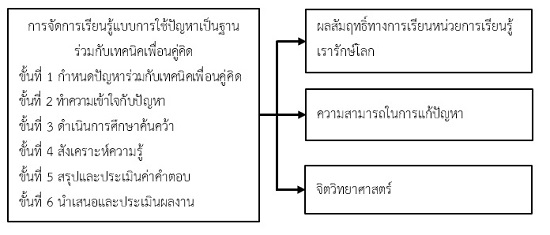A STUDY OF LEARNING ACHIEVEMENT, PROBLEM SOLVING ABILITY AND SCIENTIFIC MIND OF GRADE 8 STUDENTS USING PROBLEM-BASED LEARNING WITH A THINK-PAIR-SHARE TECHNIQUE
DOI:
https://doi.org/10.14456/nrru-rdi.2021.39Keywords:
Learning achievement, Problem solving, Scientific mind, Problem-based learning, Think-pair-share techniqueAbstract
This study’s three aims were: 1) To compare students’ learning achievement and problem-solving ability before and after learning using problem-based learning with a think-pair-share technique; 2) To compare students’ learning achievement and problem-solving ability after learning using problem-based learning with a think-pair-share technique with a criterion of 70 percent; and 3) To compare students’ scientific mind before and after learning using problem-based learning with a think-pair-share technique. The sample group in this study were 12 grade 8 students attending a secondary school in Province. The sample was selected using a cluster random sampling technique from all grade 8 students at the school. The research instruments were lesson plans, an achievement test, a problem-solving ability test and scientific mind questionnaires. The data were statistically analyzed by the Kolmogorov-Smirnov test and a t-test. The three main findings of this research were as follows: 1) Learning achievement of students after using problem-based learning with a think-pair-share technique was significantly higher than before learning and higher than the 70% criterion; 2) Problem-solving ability of students after using problem-based learning with the think-pair-share technique was significantly higher than those before learning and higher than 70% criterion; and 3) Scientific mind of students after using problem-based learning with the think-pair-share technique was significantly higher than before learning.
References
Arbsuwan, C., & Keeratichamroen, W. (2018). The Development of SciencesLearning Activities Basedon Constructivist Theory to Enhance Science Process Skills,Scientific Mind and Learning Achievement on Momentum and Collisions Learning Unitof Grade 10th Students. KKU Research Journal (Graduate Studies) Humanities and Social Sciences, 6(2), 25-36. (In Thai)
Bankheetun langchalung school. (2017). Summary report Ordinary National Educational Test. Nakhon Ratchasima: Bankheetun langchalung school. (In Thai)
Chanprasert, S. (2013). Learning Management of Science and skills needed in 21st Century. IPST, 42(185), 10-12. (In Thai)
Fitriani, A. (2018). The effectiveness of Problem Based Learning (PBL) model with cooperative type Think Pair Share (TPS) in terms of self regulated learning and student achievement result. International Conference on Mathematics and Science Education of Universitas Pendidikan Indonesia, (3), 578-582.
Hmelo, C. E., & Evensen, D. H. (2000). Problem-Based Learning: Gaining Insights on Learning Interactions Through Multiple of Inquiry. Mahwah, New Jersey : Lawrence Erlbaum Associates.
Hussain, H., & Anwar, N. (2017). Effects of Problem Based Learning on Students' Critical Thinking Skills, Attitudes towards Learning and Achievement. Journal of Educational Research, 20(2), 28-41.
Jaikla, S., & Keeratichamroen, W. (2019). A study of learning achievement on save environments learning unit and problem solving ability of grade 10 students using the problem-based learning. NRRU Community Research Journal, 13(1), 178-190. (In Thai)
Katkarn, P. (2017). The effects of problem-based learning for developing science learning achievement, problem solving abilities and scientific attitude of prathomsuksa 6 students. Journal of Education Naresuan University, 19(1), 77-89. (In Thai)
Khemmani, T. (2017). Science of Teaching: Knowledge of Efficient Learning Process Management (21th ed.). Bangkok : Chulalongkorn University Press. (In Thai)
Luenam, K. (2018). Educational Research Methodology. Nakhon Ratchasima : Korat marketing and production. (In Thai)
Moonkham, S., & Moonkham, O. (2004). 19 Learning Management Methods: To develop knowledge and skills (5th ed.). Bangkok : Phappim. (In Thai)
Naowong, J., & Keeratichamroen, W. (2019). A Study of Learning Achievement on Biomolecule Learning Unit Problems Solving Ability and Scientific Mind of Grade 10 Students Using Problem Based Learning. KKU research journal of humanities and social sciences (graduate studies), 7(3), 32-43. (In Thai)
Office of the Education Council. (2007). Problem-based Learning. Bangkok : The Agricultural Co-operative Federation of Thailand. (In Thai)
Phupatcharakun, R. (2008). A comparison of academic mathematics achievement of Prathom Suksa 5 students between deductive and combined learning methods. Cooperative model, buddy technique and normal teaching method. Thesis, Master of Educational Administration Degree in Curriculum and Instruction, Thaksin University, Songkhla. (In Thai)
Prayekti. (2016). Effects of Problem-Based Learning Model Versus Expository Model and Motivation to Achieve for Student's Physic Learning Result of Senior High School at Class Xi. Journal of Educational and Practice, 7(1), 30-37.
Sinthapanon, S. (2012). Develop thinking skills according to educational reform. Bangkok : 9119 Technic Printing. (In Thai)
Sinthapanon, S. (2015). Learning management of modern teachers to improve learners' skills in the 21st century. Bangkok : 9119 Technic Printing. (In Thai)
Thanwiset, N., & Keeratichamroen, W. (2018). A study of learning achievement on work and energy learning unit and problem solving ability for grade 10 students using problem based learning (PBL). Academic Services Journal Prince of Songkla University, 29(2), 43-50. (In Thai)
The institute for the Promotion of Teaching Science and Technology. (2012). Measurement and Assessment of Science. Bangkok : Se-education. (In Thai)
The institute for the Promotion of Teaching Science and Technology. (2018). Manual for science curriculum course Learning Science (revised edition 2017) according to the core curriculum for basic education 2008, Middle school. Retrieved September 30, 2019, from http:// scimath.org/e-books/8923/flippingbook/index.html (In Thai)
Thongchumnum, P. (2004). Elementary science teaching. Bangkok : Odeonstore. (In Thai)
Unchalenukul, P. (2017). Effects of physical education activities management in petanque sport using think-pair-share on problem-solving ability in playing petanque of upper secondary school students. Thesis, Master of Education Degree in Health and Physical Education, Chulalongkorn University, Bangkok. (In Thai)
Wilson, J. w., Femandez, M. L., & Hadaway, N. (1993). Mathematical problem solving. In Wilson, P. S. (Ed.), Research ideas for the classroom: High school mathematics (pp. 57-78). New York : MacMillan.
Wongaiam, S. (2015). The development of learning achievement and ability in problems solving thinking in life and environment for grade 10 students using problem based learning. Thesis, Master of Education Degree in Science Teaching, Burapha University, Chon Buri. (In Thai)
Wonglert, W. (2001) The Development of Multimedia Computer Assisted Instruction on SETS" For Mathayomsuksa IV By Using Think-Pair-Share Technique. Thesis, Master of Education Degree in Secondary Education, Srinakharinwirot University, Bangkok. (In Thai)





